- Home
- H. Beam Piper
The H. Beam Piper Megapack Page 2
The H. Beam Piper Megapack Read online
Page 2
He blinked. He could see them!
* * * *
For a long time, he lay staring at them unbelievingly, and then he deliberately closed his eyes and counted ten seconds, and as he counted, terror gripped him. He was afraid to open them again, lest he find himself blind, or gazing at the filth and wreckage of a blasted city, but when he reached ten, he forced himself to look, and gave a sigh of relief. The sunlit curtains and the sun-gilded mist outside were still there.
He reached out to check one sense against another, feeling the rough monk’s cloth and the edging of maroon silk thread. They were tangible as well as visible. Then he saw that the back of his hand was unscarred. There should have been a scar, souvenir of a rough-and-tumble brawl of his cub reporter days. He examined both hands closely. An instant later, he had sat up in bed and thrown off the covers, partially removing his pajamas and inspecting as much of his body as was visible.
It was the smooth body of a little boy.
That was ridiculous. He was a man of forty-three; an army officer, a chemist, once a best-selling novelist. He had been married, and divorced ten years ago. He looked again at his body. It was only twelve years old. Fourteen, at the very oldest. His eyes swept the room, wide with wonder. Every detail was familiar: the flower-splashed chair covers; the table that served as desk and catch-all for his possessions; the dresser, with its mirror stuck full of pictures of aircraft. It was the bedroom of his childhood home. He swung his legs over the edge of the bed. They were six inches too short to reach the floor.
For an instant, the room spun dizzily; and he was in the grip of utter panic, all confidence in the evidence of his senses lost. Was he insane? Or delirious? Or had the bomb really killed him; was this what death was like? What was that thing, about “ye become as little children”? He started to laugh, and his juvenile larynx made giggling sounds. They seemed funny, too, and aggravated his mirth. For a little while, he was on the edge of hysteria and then, when he managed to control his laughter, he felt calmer. If he were dead, then he must be a discarnate entity, and would be able to penetrate matter. To his relief, he was unable to push his hand through the bed. So he was alive; he was also fully awake, and, he hoped, rational. He rose to his feet and prowled about the room, taking stock of its contents.
There was no calendar in sight, and he could find no newspapers or dated periodicals, but he knew that it was prior to July 18, 1946. On that day, his fourteenth birthday, his father had given him a light .22 rifle, and it had been hung on a pair of rustic forks on the wall. It was not there now, nor ever had been. On the table, he saw a boys’ book of military aircraft, with a clean, new dustjacket; the flyleaf was inscribed: To Allan Hartley, from his father, on his thirteenth birthday, 7/18 ’45. Glancing out the window at the foliage on the trees, he estimated the date at late July or early August, 1945; that would make him just thirteen.
His clothes were draped on a chair beside the bed. Stripping off his pajamas, he donned shorts, then sat down and picked up a pair of lemon-colored socks, which he regarded with disfavor. As he pulled one on, a church bell began to clang. St. Boniface, up on the hill, ringing for early Mass; so this was Sunday. He paused, the second sock in his hand.
There was no question that his present environment was actual. Yet, on the other hand, he possessed a set of memories completely at variance with it. Now, suppose, since his environment were not an illusion, everything else were? Suppose all these troublesome memories were no more than a dream? Why, he was just little Allan Hartley, safe in his room on a Sunday morning, badly scared by a nightmare! Too much science fiction, Allan; too many comic books!
That was a wonderfully comforting thought, and he hugged it to him contentedly. It lasted all the while he was buttoning up his shirt and pulling on his pants, but when he reached for his shoes, it evaporated. Ever since he had wakened, he realized, he had been occupied with thoughts utterly incomprehensible to any thirteen-year-old; even thinking in words that would have been so much Sanscrit to himself at thirteen. He shook his head regretfully. The just-a-dream hypothesis went by the deep six.
He picked up the second shoe and glared at it as though it were responsible for his predicament. He was going to have to be careful. An unexpected display of adult characteristics might give rise to some questions he would find hard to answer credibly. Fortunately, he was an only child; there would be no brothers or sisters to trip him up. Old Mrs. Stauber, the housekeeper, wouldn’t be much of a problem; even in his normal childhood, he had bulked like an intellectual giant in comparison to her. But his father—
Now, there the going would be tough. He knew that shrewd attorney’s mind, whetted keen on a generation of lying and reluctant witnesses. Sooner or later, he would forget for an instant and betray himself. Then he smiled, remembering the books he had discovered, in his late ’teens, on his father’s shelves and recalling the character of the openminded agnostic lawyer. If he could only avoid the inevitable unmasking until he had a plausible explanatory theory.
* * * *
Blake Hartley was leaving the bathroom as Allan Hartley opened his door and stepped into the hall. The lawyer was bare-armed and in slippers; at forty-eight, there was only a faint powdering of gray in his dark hair, and not a gray thread in his clipped mustache. The old Merry Widower, himself, Allan thought, grinning as he remembered the white-haired but still vigorous man from whom he’d parted at the outbreak of the War.
“’Morning, Dad,” he greeted.
“’Morning, son. You’re up early. Going to Sunday school?”
Now there was the advantage of a father who’d cut his first intellectual tooth on Tom Paine and Bob Ingersoll; attendance at divine services was on a strictly voluntary basis.
“Why, I don’t think so; I want to do some reading, this morning.”
“That’s always a good thing to do,” Blake Hartley approved. “After breakfast, suppose you take a walk down to the station and get me a Times.” He dug in his trouser pocket and came out with a half dollar. “Get anything you want for yourself, while you’re at it.”
Allan thanked his father and pocketed the coin.
“Mrs. Stauber’ll still be at Mass,” he suggested. “Say I get the paper now; breakfast won’t be ready till she gets here.”
“Good idea.” Blake Hartley nodded, pleased. “You’ll have three-quarters of an hour, at least.”
* * * *
So far, he congratulated himself, everything had gone smoothly. Finishing his toilet, he went downstairs and onto the street, turning left at Brandon to Campbell, and left again in the direction of the station. Before he reached the underpass, a dozen half-forgotten memories had revived. Here was a house that would, in a few years, be gutted by fire. Here were four dwellings standing where he had last seen a five-story apartment building. A gasoline station and a weed-grown lot would shortly be replaced by a supermarket. The environs of the station itself were a complete puzzle to him, until he oriented himself.
He bought a New York Times, glancing first of all at the date line. Sunday, August 5, 1945; he’d estimated pretty closely. The battle of Okinawa had been won. The Potsdam Conference had just ended. There were still pictures of the B-25 crash against the Empire State Building, a week ago Saturday. And Japan was still being pounded by bombs from the air and shells from off-shore naval guns. Why, tomorrow, Hiroshima was due for the Big Job! It amused him to reflect that he was probably the only person in Williamsport who knew that.
On the way home, a boy, sitting on the top step of a front porch, hailed him. Allan replied cordially, trying to remember who it was. Of course; Larry Morton! He and Allan had been buddies. They probably had been swimming, or playing Commandos and Germans, the afternoon before. Larry had gone to Cornell the same year that Allan had gone to Penn State; they had both graduated in 1954. Larry had gotten into some Government bureau, and then he had married a Pittsburgh girl, and had become twelfth vice-president of her father’s firm. He had been killed, in 1968, in a plane cra
sh.
“You gonna Sunday school?” Larry asked, mercifully unaware of the fate Allan foresaw for him.
“Why, no. I have some things I want to do at home.” He’d have to watch himself. Larry would spot a difference quicker than any adult. “Heck with it,” he added.
“Golly, I wisht I c’ld stay home from Sunday school whenever I wanted to,” Larry envied. “How about us goin’ swimmin’, at the Canoe Club, ’safter?”
Allan thought fast. “Gee, I wisht I c’ld,” he replied, lowering his grammatical sights. “I gotta stay home, ’safter. We’re expectin’ comp’ny; coupla aunts of mine. Dad wants me to stay home when they come.”
That went over all right. Anybody knew that there was no rational accounting for the vagaries of the adult mind, and no appeal from adult demands. The prospect of company at the Hartley home would keep Larry away, that afternoon. He showed his disappointment.
“Aw, jeepers creepers!” he blasphemed euphemistically.
“Mebbe t’morrow,” Allan said. “If I c’n make it. I gotta go, now; ain’t had breakfast yet.” He scuffed his feet boyishly, exchanged so-longs with his friend, and continued homeward.
* * * *
As he had hoped, the Sunday paper kept his father occupied at breakfast, to the exclusion of any dangerous table talk. Blake Hartley was still deep in the financial section when Allan left the table and went to the library. There should be two books there to which he wanted badly to refer. For a while, he was afraid that his father had not acquired them prior to 1945, but he finally found them, and carried them onto the front porch, along with a pencil and a ruled yellow scratch pad. In his experienced future—or his past-to-come—Allan Hartley had been accustomed to doing his thinking with a pencil. As reporter, as novelist plotting his work, as amateur chemist in his home laboratory, as scientific warfare research officer, his ideas had always been clarified by making notes. He pushed a chair to the table and built up the seat with cushions, wondering how soon he would become used to the proportional disparity between himself and the furniture. As he opened the books and took his pencil in his hand, there was one thing missing. If he could only smoke a pipe, now!
His father came out and stretched in a wicker chair with the Times book-review section. The morning hours passed. Allan Hartley leafed through one book and then the other. His pencil moved rapidly at times; at others, he doodled absently. There was no question, any more, in his mind, as to what or who he was. He was Allan Hartley, a man of forty-three, marooned in his own thirteen-year-old body, thirty years back in his own past. That was, of course, against all common sense, but he was easily able to ignore that objection. It had been made before: against the astronomy of Copernicus, and the geography of Columbus, and the biology of Darwin, and the industrial technology of Samuel Colt, and the military doctrines of Charles de Gaulle. Today’s common sense had a habit of turning into tomorrow’s utter nonsense. What he needed, right now, but bad, was a theory that would explain what had happened to him.
Understanding was beginning to dawn when Mrs. Stauber came out to announce midday dinner.
“I hope you von’t mind haffin’ it so early,” she apologized. “Mein sister, Jennie, offer in Nippenose, she iss sick; I vant to go see her, dis afternoon, yet. I’ll be back in blenty time to get supper, Mr. Hartley.”
“Hey, Dad!” Allan spoke up. “Why can’t we get our own supper, and have a picnic, like? That’d be fun, and Mrs. Stauber could stay as long as she wanted to.”
His father looked at him. Such consideration for others was a most gratifying deviation from the juvenile norm; dawn of altruism, or something. He gave hearty assent:
“Why, of course, Mrs. Stauber. Allan and I can shift for ourselves, this evening; can’t we, Allan? You needn’t come back till tomorrow morning.”
“Ach, t’ank you! T’ank you so mooch, Mr. Hartley.”
At dinner, Allan got out from under the burden of conversation by questioning his father about the War and luring him into a lengthy dissertation on the difficulties of the forthcoming invasion of Japan. In view of what he remembered of the next twenty-four hours, Allan was secretly amused. His father was sure that the War would run on to mid-1946.
After dinner, they returned to the porch, Hartley père smoking a cigar and carrying out several law books. He only glanced at these occasionally; for the most part, he sat and blew smoke rings, and watched them float away. Some thrice-guilty felon was about to be triumphantly acquitted by a weeping jury; Allan could recognize a courtroom masterpiece in the process of incubation.
* * * *
It was several hours later that the crunch of feet on the walk caused father and son to look up simultaneously. The approaching visitor was a tall man in a rumpled black suit; he had knobby wrists and big, awkward hands; black hair flecked with gray, and a harsh, bigoted face. Allan remembered him. Frank Gutchall. Lived on Campbell Street; a religious fanatic, and some sort of lay preacher. Maybe he needed legal advice; Allan could vaguely remember some incident—
“Ah, good afternoon, Mr. Gutchall. Lovely day, isn’t it?” Blake Hartley said.
Gutchall cleared his throat. “Mr. Hartley, I wonder if you could lend me a gun and some bullets,” he began, embarrassedly. “My little dog’s been hurt, and it’s suffering something terrible. I want a gun, to put the poor thing out of its pain.”
“Why, yes; of course. How would a 20-gauge shotgun do?” Blake Hartley asked. “You wouldn’t want anything heavy.”
Gutchall fidgeted. “Why, er, I was hoping you’d let me have a little gun.” He held his hands about six inches apart. “A pistol, that I could put in my pocket. It wouldn’t look right, to carry a hunting gun on the Lord’s day; people wouldn’t understand that it was for a work of mercy.”
The lawyer nodded. In view of Gutchall’s religious beliefs, the objection made sense.
“Well, I have a Colt .38-special,” he said, “but you know, I belong to this Auxiliary Police outfit. If I were called out for duty, this evening, I’d need it. How soon could you bring it back?”
Something clicked in Allan Hartley’s mind. He remembered, now, what that incident had been. He knew, too, what he had to do.
“Dad, aren’t there some cartridges left for the Luger?” he asked.
Blake Hartley snapped his fingers. “By George, yes! I have a German automatic I can let you have, but I wish you’d bring it back as soon as possible. I’ll get it for you.”
Before he could rise, Allan was on his feet.
“Sit still, Dad; I’ll get it. I know where the cartridges are.” With that, he darted into the house and upstairs.
The Luger hung on the wall over his father’s bed. Getting it down, he dismounted it, working with rapid precision. He used the blade of his pocketknife to unlock the endpiece of the breechblock, slipping out the firing pin and buttoning it into his shirt pocket. Then he reassembled the harmless pistol, and filled the clip with 9-millimeter cartridges from the bureau drawer.
There was an extension telephone beside the bed. Finding Gutchall’s address in the directory, he lifted the telephone, and stretched his handkerchief over the mouthpiece. Then he dialed Police Headquarters.
“This is Blake Hartley,” he lied, deepening his voice and copying his father’s tone. “Frank Gutchall, who lives at…take this down”—he gave Gutchall’s address—“has just borrowed a pistol from me, ostensibly to shoot a dog. He has no dog. He intends shooting his wife. Don’t argue about how I know; there isn’t time. Just take it for granted that I do. I disabled the pistol—took out the firing pin—but if he finds out what I did, he may get some other weapon. He’s on his way home, but he’s on foot. If you hurry, you may get a man there before he arrives, and grab him before he finds out the pistol won’t shoot.”
“O. K., Mr. Hartley. We’ll take care of it. Thanks.”
“And I wish you’d get my pistol back, as soon as you can. It’s something I brought home from the other War, and I shouldn’t like to lose it.”
“We’ll take care of that, too. Thank you, Mr. Hartley.”
He hung up, and carried the Luger and the loaded clip down to the porch.
* * * *
“Look, Mr. Gutchall; here’s how it works,” he said, showing it to the visitor. Then he slapped in the clip and yanked up on the toggle loading the chamber. “It’s ready to shoot, now; this is the safety.” He pushed it on. “When you’re ready to shoot, just shove it forward and up, and then pull the trigger. You have to pull the trigger each time; it’s loaded for eight shots. And be sure to put the safety back when you’re through shooting.”
“Did you load the chamber?” Blake Hartley demanded.
“Sure. It’s on safe, now.”
“Let me see.” His father took the pistol, being careful to keep his finger out of the trigger guard, and looked at it. “Yes, that’s all right.” He repeated the instructions Allan had given, stressing the importance of putting the safety on after using. “Understand how it works, now?” he asked.
“Yes, I understand how it works. Thank you, Mr. Hartley. Thank you, too, young man.”
Gutchall put the Luger in his hip pocket, made sure it wouldn’t fall out, and took his departure.
“You shouldn’t have loaded it,” Hartley père reproved, when he was gone.
Allan sighed. This was it; the masquerade was over.
“I had to, to keep you from fooling with it,” he said. “I didn’t want you finding out that I’d taken out the firing pin.”
“You what?”
“Gutchall didn’t want that gun to shoot a dog. He has no dog. He meant to shoot his wife with it. He’s a religious maniac; sees visions, hears voices, receives revelations, talks with the Holy Ghost. The Holy Ghost probably put him up to this caper. I’ll submit that any man who holds long conversations with the Deity isn’t to be trusted with a gun, and neither is any man who lies about why he wants one. And while I was at it, I called the police, on the upstairs phone. I had to use your name; I deepened my voice and talked through a handkerchief.”

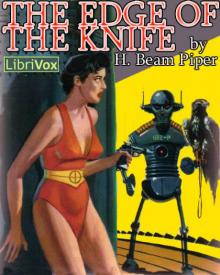 The Edge of the Knife
The Edge of the Knife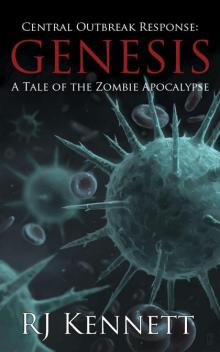 Genesis
Genesis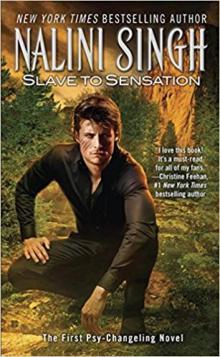 A Slave is a Slave
A Slave is a Slave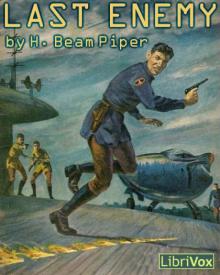 Last Enemy
Last Enemy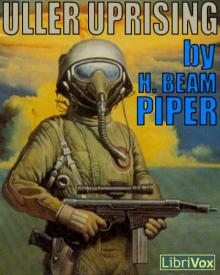 Uller Uprising
Uller Uprising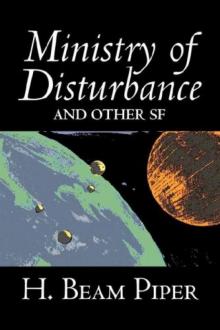 Ministry of Disturbance
Ministry of Disturbance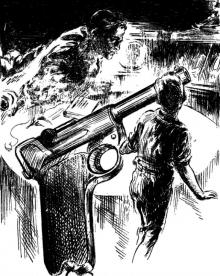 Time and Time Again
Time and Time Again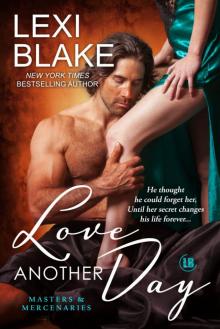 The Mercenaries
The Mercenaries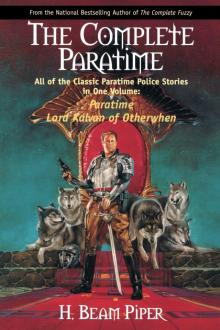 Police Operation
Police Operation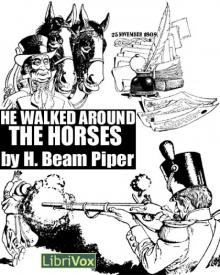 He Walked Around the Horses
He Walked Around the Horses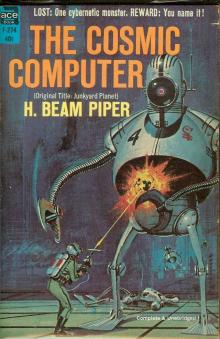 Time Crime
Time Crime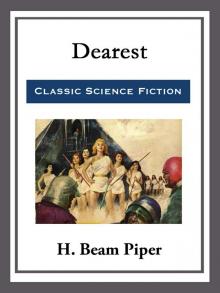 Dearest
Dearest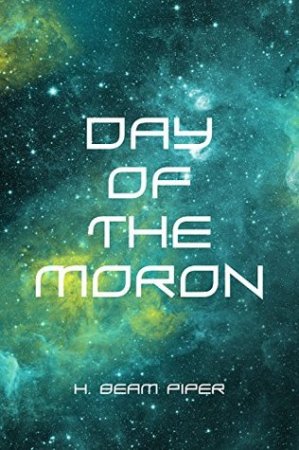 Day of the Moron
Day of the Moron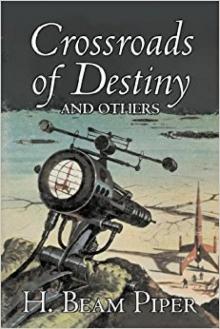 Crossroads of Destiny
Crossroads of Destiny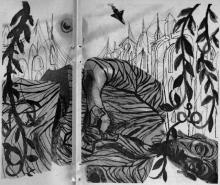 Graveyard of Dreams
Graveyard of Dreams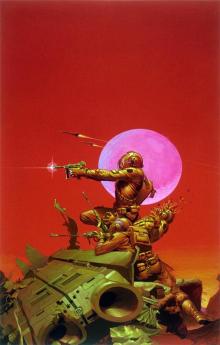 The Cosmic Computer
The Cosmic Computer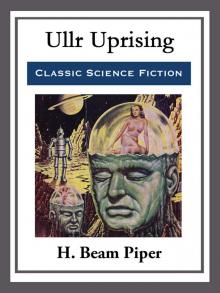 Ullr Uprising
Ullr Uprising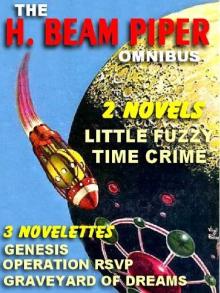 Operation R.S.V.P.
Operation R.S.V.P.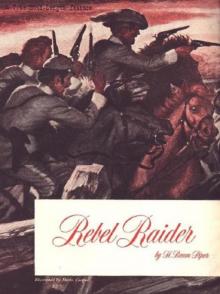 Rebel Raider
Rebel Raider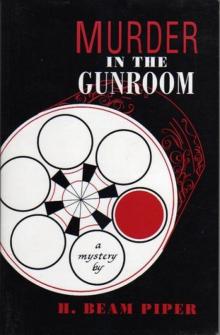 Murder in the Gunroom
Murder in the Gunroom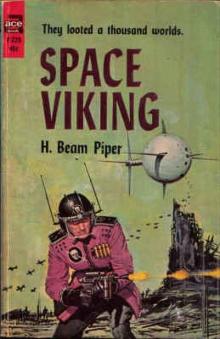 Space Viking
Space Viking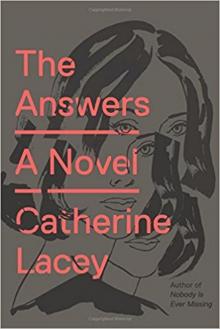 The Answer
The Answer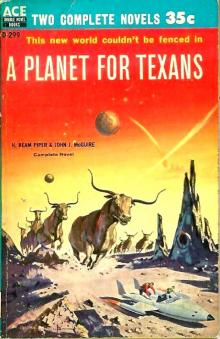 A Planet for Texans (aka Lone Star Planet)
A Planet for Texans (aka Lone Star Planet)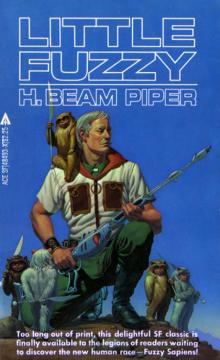 Little Fuzzy
Little Fuzzy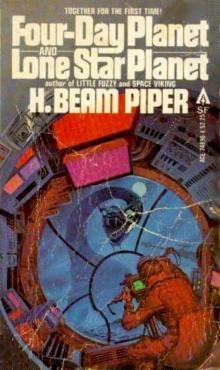 Four-Day Planet
Four-Day Planet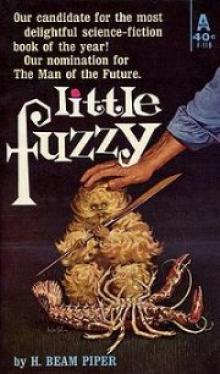 Little Fuzzy f-1
Little Fuzzy f-1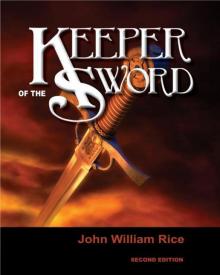 Keeper
Keeper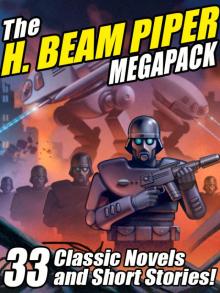 The H. Beam Piper Megapack
The H. Beam Piper Megapack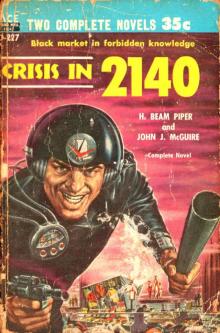 H. Beam Piper
H. Beam Piper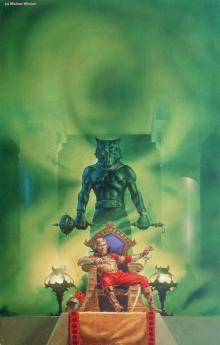 Lord Kalvan of Otherwhen
Lord Kalvan of Otherwhen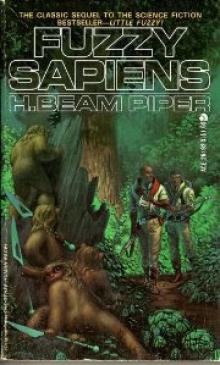 Fuzzy Sapiens f-2
Fuzzy Sapiens f-2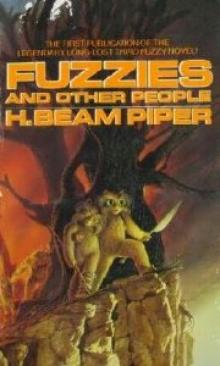 Fuzzies and Other People f-3
Fuzzies and Other People f-3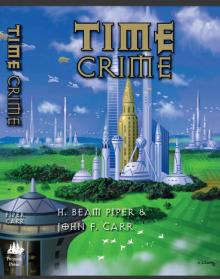 TIME PRIME
TIME PRIME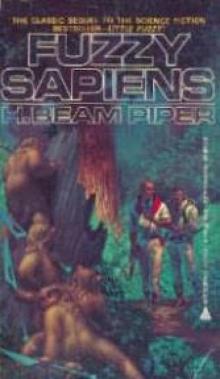 Fuzzy Sapiens
Fuzzy Sapiens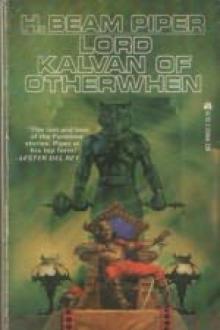 Lord Kalvan of Otherwhen k-1
Lord Kalvan of Otherwhen k-1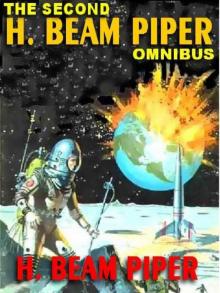 The Second H. Beam Piper Omnibus
The Second H. Beam Piper Omnibus